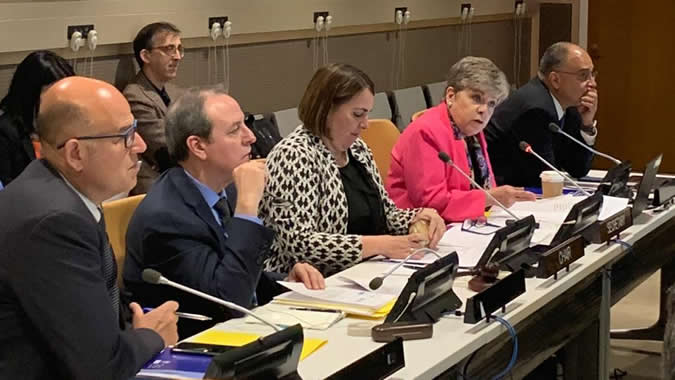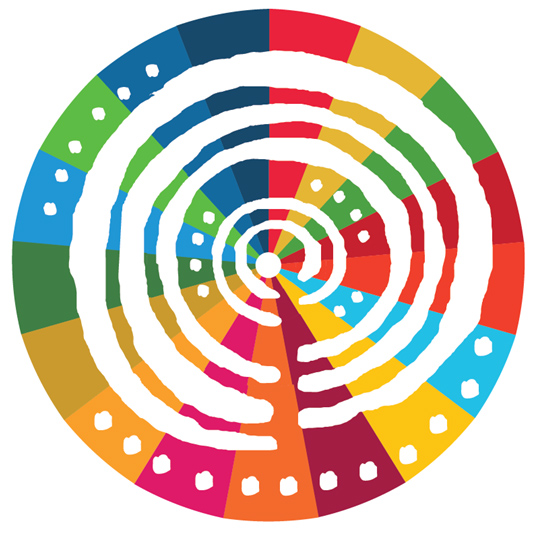In ECLAC’s Committee of the Whole, Countries of the Region Analyzed the Prospects for Sustainable Development at the Current Economic Juncture
The Executive Secretary Alicia Bárcena gave an overview of Latin America and the Caribbean’s economic and social situation and informed participants about the Commission’s priorities for tackling the region’s most pressing challenges.

Representatives of 35 Member States and associate members of the Economic Commission for Latin America and the Caribbean (ECLAC) participated this Tuesday, October 15, in the thirty-fourth session of the Committee of the Whole of the regional organization, where they reviewed the institution’s work program and analyzed the prospects for sustainable development in the region in a scenario of uncertainty and economic deceleration.
The meeting, held at the United Nations’ headquarters in New York, was inaugurated by Alicia Bárcena, ECLAC’s Executive Secretary, and Ana Silvia Rodríguez Abascal, Deputy Permanent Representative of Cuba to the United Nations. Cuba holds the Committee of the Whole’s Presidency pro tempore.
“The challenge facing Latin America and the Caribbean today is to be able to achieve sustainable development by closing economic, social and environmental gaps in a complex context,” Bárcena sustained before the ambassadors of the region. “The economic deceleration process continues with negative rates for the regional average and for South America. In the first quarter of 2019, Latin America’s economic activity contracted 0.1% versus the same period of 2018,” the senior official noted.
This lower growth, she said, has stalled progress on matters of poverty and income distribution, and this is added to the impact of global phenomena such as climate change, to which Latin America – and the Caribbean in particular – is especially vulnerable.
Between 1990 and 2017, 408 disasters were recorded in the Caribbean: 90.4% of them originated with hydro-climatic phenomena such as floods, storms and tropical cyclones, Bárcena indicated.
“Climate change necessitates that we take action today,” stressed the Executive Secretary, who shared with the region’s representatives the progress made by two thematic coalitions led by ECLAC to tackle this and other critical issues such as migration.
The first of these is “The Caribbean First” strategy, one of the objectives of which is to operationalize the initiative to swap debt for climate change adaptation, in addition to offering support for the development of statistical capacities and for disaster prevention and evaluation in the subregion.
The second is the Comprehensive Development Plan for northern Central America and Mexico, which aims to create an economic and social space among the 8 States of south-southeastern Mexico and El Salvador, Guatemala and Honduras, based on four strategic pillars selected by the countries: economic development; social well-being; environmental sustainability and adaptation to climate change; and comprehensive management of the migration cycle.
At the gathering, Bárcena reiterated that “the fulfillment of the 2030 Agenda for Sustainable Development in Latin America and the Caribbean is at a critical point,” so “it calls for reorienting development towards an environmental big push as the articulator of policies, sectors and actors.” She also added: “It is time to invest in projects that reduce carbon emissions.”
Meanwhile, Cuba’s Deputy Permanent Representative to the UN, Ana Silvia Rodríguez Abascal, reported on preparations for the Fourth Meeting of the Forum of the Countries of Latin America and the Caribbean on Sustainable Development, which will take place in April 2020 in Havana. And Rodrigo Carazo, Costa Rica’s Permanent Representative to the UN, did the same with regard to ECLAC’s thirty-eighth session, which will be held in San José on May 25-29 of that same year. Both ambassadors invited the delegations to actively participate in these regional events.
Also during the session of the Committee of the Whole, ECLAC’s Deputy Executive Secretary for Management and Program Analysis, Raúl García-Buchaca, presented the Commission’s activities report corresponding to 2018, along with a proposed work program for the ECLAC system for 2021.
The representatives gathered in New York underlined the wide-ranging outcomes achieved by the Commission in the different areas of work, commending especially its results-based approach and capacity to respond to the needs of the region. In addition to approving the Commission’s work plan for 2021, they stressed the fact that it is aligned with and adapts to the new requirements arising from the 2030 Agenda and its goals and targets, as well as from internationally agreed-upon action plans and instruments.
Related content

Country(ies)
- Latin America and the Caribbean
Contact
Public Information Unit
- prensa@cepal.org
- (56 2) 2210 2040
